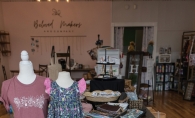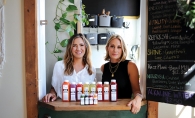Cindie Sinclair always considered herself an artist. She just never knew that her art would involve flowers. “I have always been an artist at heart, I just never found the right medium,” Sinclair says.
Sinclair studied graphic design at Minneapolis Technical College and interior design at the University of Minnesota, but says she didn’t really know exactly what she wanted to do for a career. After college, she spent five years working in a downtown Minneapolis flower shop. On her last day before leaving to spend six months in England, she met a local peony grower.
He asked Sinclair what she planned on doing when she returned from abroad, and she told him she didn’t know. He recommended she do what he does—cut flowers and create arrangements.
While in England, she became enamored with the way people led “country lives,” growing their own plants and living off of nature. She wanted the same simplicity. When she returned, she started looking into becoming a rural florist.
Sinclair purchased the farm she now calls Camrose Hill (named after her golden retriever’s kennel). At the time, Sinclair knew little about farming and had no background in gardening, but she was interested in learning as much as she could. She got a job with the peony grower who had planted the idea in her head and learned everything she could about growing her own flowers.
Using her new land to grow her own plants, she started her own business 25 years ago, and it’s still going strong.
“The process of arranging flowers can be an art if you approach it that way,” Sinclair says. That is the approach she took when she first started and the one she still takes today.
Sinclair’s goal is to get to know her customers’ needs—whether they want flowers for a wedding, funeral or anything else—and create a bouquet or arrangement that can portray a feeling words sometimes cannot.
“It seems like what I’ve gotten good at is understanding someone else’s vision,” Sinclair says, “meaning a bride who wants a particular look or a funeral for someone who was a gardener and loves berries.”
Being in the flower business, weddings are one of Sinclair’s specialties. Her farm has played an integral role in that business. While she has a shop in Stillwater, the farm is where brides come for inspiration and the place that showcases some of Sinclair’s best flowers.
While the farm was always a special place, it wasn’t until a bride came to meet Sinclair and talk flowers that she opened it up as a wedding venue. The bride asked if she could get married at the farm, and Sinclair moved into the wedding venue business to go with her floral work. Already having relationships with vendors from her years as a florist, it was a natural progression.
Sinclair’s business has evolved through the years, but the constant always has been the plants and her garden. Those always will be Sinclair’s favorite part. It’s the connection with nature that keeps her going.
“We don’t understand the power of plants,” Sinclair says. “Plants are communicating with us on a level we are too human to understand.”









